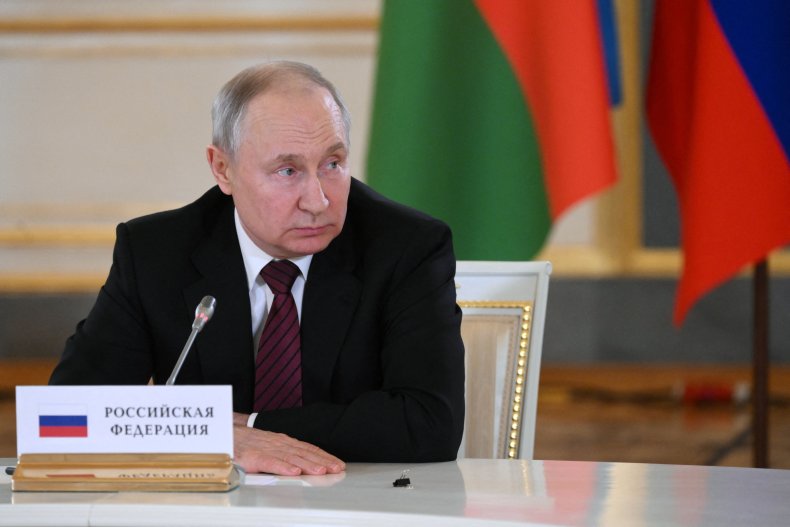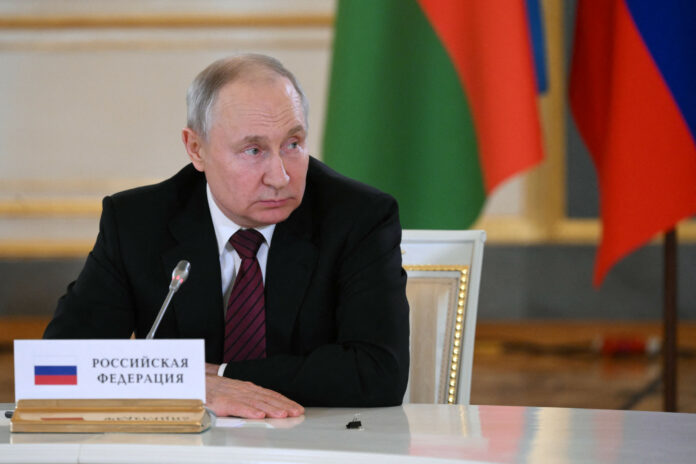Russian President Vladimir Putin is trying to downplay the recent drone attacks on Moscow because of his lack of retaliatory options, according to the Institute for the Study of War, while the response from the broader Russian political sphere has been “varied.”
In its Tuesday evening bulletin, the ISW said Putin’s response to the drone attacks—which Moscow has blamed on Kyiv but which Ukrainian officials have denied—appeared designed to boost Russian public support for the stalled invasion of Ukraine via “boilerplate” false narratives.
The drone strikes occurred early on Tuesday morning, damaging at least three residential buildings but causing no known casualties. The Kremlin said eight drones were aimed at the capital, five of which were shot down with the other three forced off course by electronic countermeasures. Russian bloggers suggested as many as 30 unmanned aerial vehicles may have been involved but this has not been verified.
Putin suggested the attacks were designed to frighten Russians and provoke retaliation from Moscow, admitting there is “work” to be done to improve the capital’s air defense umbrella. The president compared the attack to drone swarm attacks that have previously targeted the Russia’s Khmeimim air base in Syria.
KIRILL KUDRYAVTSEV/AFP via Getty Images
Russia Responds
The ISW said Putin’s response may speak to his difficult political position.
“Putin attempted to downplay the drone attack on Moscow to avoid exposing the limited options he has to retaliate against Ukraine,” the ISW report read, noting the president’s suggestion that the drone attacks were a retaliation for strikes Putin claimed have been carried out on Ukrainian military intelligence headquarters in recent days.
This claim, the ISW said, does not correspond with Russian Defense Ministry action reports. Newsweek has contacted the ministry by email to request comment.
“Putin stated that Ukraine is trying to provoke a response and make Russia ‘mirror’ its actions,” the ISW wrote. “Putin’s emphasis on past and ongoing missile strikes is likely an attempt to signal that Russia is already actively retaliating and does not need to respond to further Ukrainian provocations.
“Putin has consistently retaliated against genuine and purported Ukrainian actions by ordering massive missile and drone campaigns, likely due to Russian forces’ inability to achieve any decisive effects on the battlefield.
“Putin additionally pushed numerous Kremlin boilerplate narratives aimed at maintaining domestic support for the Russian war effort and villainizing the West. Putin also noted that, while the Moscow air defense systems ‘worked normally,’ Russia still needs to ‘work’ on improving these systems—a notable attempt to preempt criticism from Russian ultra-nationalists who have been criticizing Russia’s ineffective air defense systems in Moscow and along the Russian border regions with Ukraine.
“Putin also accused Ukraine of threatening to destabilize the Zaporizhzhia Nuclear Power Plant and using ‘dirty devices’—both default Russian false narratives that the Kremlin uses during Russian military failures.”
The ‘Fog of War’
Hawkish Russian military bloggers were critical of the official response to the strikes. Igor Girkin—the former FSB officer who played a key role in Russia’s seizure of Crimea and parts of the Ukrainian Donbas region in 2014—mocked Putin for maintaining the Kremlin line that the conflict in Ukraine is a “special military operation” rather than a full-blown war.
Wagner Group chief Yevgney Prigozhin and Chechen leader Ramzan Kadyrov—both of whom have urged Putin to shift Russia to a full military footing in order to win the war—called for a punitive response.
Prigozhin said Russian officials should do more to defend the country rather than “sitting quietly,” while Kadyrov suggested retaliating against European nations that are supplying Ukraine with vital military aid.
Ukrainian presidential aide Mykhailo Podolyak denied Ukrainian involvement in the attack, although he said Kyiv was watching it “with enjoyment” and predicted similar attacks in the future. Ukrainian officials routinely deny attacks on Russian territory.
Oleksandr Merezhko, a member of the Ukrainian parliament and chair of its foreign affairs committee, told Newsweek that the “fog of war” makes it difficult to ascertain the nature of the most recent Moscow drone attack.

ILYA PITALEV/SPUTNIK/AFP via Getty Images
“I don’t know for sure what happened,” Merezhko said, suggesting the seemingly unsophisticated nature of the UAVs may point to “some kind of operation by internal forces of resistance in Russia.”
Alternatively, he said, “it might have been provocation by Russian special services with a view to scare Russians on the eve of the presidential elections in Russia, which will take place in less than a year.”
“We also cannot completely rule out that it was a special operation by our army,” Merezhko added. “But, of course, in such cases there is no confirmation or denial.”
“What is interesting is that this attack of drones has shown that Russian air defense is weak,” he said, suggesting the attack and recent cross-border infiltrations by Kyiv-affiliated, anti-Putin Russian fighters hint at serious problems within the Russian armed forces.
“Lenin once said that the czarist regime in Russia only looks solid; in reality it’s rotten inside,” Merezhko said. “If you touch it, it starts collapsing.”


